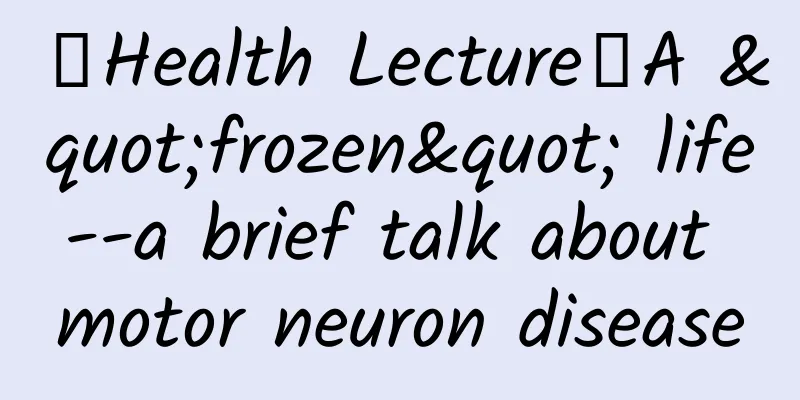【Health Lecture】A "frozen" life--a brief talk about motor neuron disease

|
In order to ensure the popularization effect of learning health knowledge in the 3rd China Elderly Health Knowledge Competition, the organizers have collected various health science articles suitable for the elderly to learn from various hospitals. We will share them through the "Health Lecture Hall" column. Today, Dr. Qi Jingyuan from the Second Department of Neurological Rehabilitation of Beijing Boai Hospital, China Rehabilitation Research Center, brought us "A "Frozen" Life-A Brief Introduction to Motor Neuron Disease", and welcome elderly friends to learn. On August 11, 2020, the state awarded national medals and national honorary titles to people who made outstanding contributions in the fight against the new crown pneumonia epidemic. Zhang Dingyu, then deputy director of the Hubei Provincial Health Commission and director of Wuhan Jinyintan Hospital, was awarded the national honorary title of "People's Hero". At the anti-epidemic commendation meeting, the scene of Zhang Dingyu staggering to accept the medal moved many people. Yes, in addition to being a pioneer in the fight against the epidemic who led by example and made outstanding contributions, Dean Zhang is an infectious disease expert with superb medical skills and a patient with motor neuron disease (Figure 1). Figure 1 “People’s Hero” Zhang Dingyu Motor neuron disease, also known as amyotrophic lateral sclerosis (ALS), is a chronic progressive neurodegenerative disease that invades the spinal cord, brainstem and brain neurons. Its main symptoms are gradually worsening muscle atrophy and weakness. Patients will slowly lose their basic abilities such as limb movement, speaking, swallowing and eating, just like being frozen, so it is commonly known as "Lou Gestational Frost Syndrome". The Taiwan Motor Neuron Disease Patient Association once vividly described the patient's voice: I am not a vegetable, but my whole body is gradually unable to move; I have something to say, but I can't say it; I want to eat, but I can't swallow; I want to scratch, but my hands can't move; I want to move, but my feet can't stand up... The incidence of motor neuron disease is only 1-2/100,000, and it has been included in the "First Batch of Rare Diseases" catalog in our country. Next, we will approach this rare disease that "freezes" the patient's life. [Mysterious cause] So far, the cause of motor neuron disease is still not very clear. The general understanding is that the accumulation of toxic substances in the nervous system caused by various reasons damages the motor nerve cells, causing them to decrease and die, thus causing the disease. Data show that elderly men, a history of trauma, and excessive physical labor may all be risk factors for the disease. About 5-10% of patients have a family history. 【Clues】 ALS is a disease that gradually worsens. Early onset of the disease will have the following "clues": 1. Clumsiness in one or both hands, difficulty in doing fine movements, such as opening doors with keys, typing on computers or mobile phones, etc. 60-70% of patients develop this disease; 2. Legs and feet are not flexible, prone to "cramps", easy to fall when walking, and asymmetric symptoms on both sides; 3. Speech is unclear, eating and drinking water choke cough; 4. There is a feeling of "flesh twitching", or the muscle tremors can be seen. If the above symptoms occur in daily life, especially in middle-aged and elderly men, you should seek medical attention in time for a clear diagnosis. 【Confirmation of acupuncture】 In addition to a detailed medical history and physical examination, needle electromyography (Figure 2) is the most important diagnostic tool and is also important for differentiating from other diseases. Electromyography in confirmed patients often shows extensive neuronal damage. CT and MRI examinations of the head are of little value in diagnosing motor neuron disease. Figure 2 Electromyography [Emerging Treatment] Usually, the treatment of a disease includes two aspects: causal treatment and symptomatic treatment. Since the cause of ALS is unclear, the drugs for causal treatment are very limited. Riluzole can inhibit the release of amino acids that damage neurons and is currently the only drug that has been clinically proven to delay the progression of the disease. Other drugs such as butylphthalide, edaravone, and more cutting-edge gene therapy and stem cell therapy are still under research and exploration. The purpose of symptomatic treatment is to prolong survival and maximize the quality of life. Dysphagia and respiratory muscle paralysis are the two main aspects that threaten the survival of patients. Many readers know that dysphagia requires a gastric tube to feed, but it is currently advocated that ALS patients undergo percutaneous gastrostomy as soon as possible (Figure 3), that is, a tube is placed from the abdominal wall into the stomach with the assistance of a gastroscope, and food is injected through this tube. This method can not only ensure energy supply, but also reduce the chance of lung infection caused by food reflux. At the end of the disease, the patient's respiratory muscles are weak and require tracheotomy and mechanical ventilation. For some early patients who do not have symptoms of dyspnea, lung function tests should be completed. If it shows that there is already insufficient ventilation, it is recommended to use non-invasive ventilators as soon as possible to avoid hypoxia that accelerates neuronal degeneration. High-protein, high-calorie diets, respiratory management, and psychological intervention are all beneficial symptomatic measures. Figure 3 Schematic diagram of percutaneous gastrostomy In addition, rehabilitation training of movement, swallowing, and breathing functions can improve the patient's quality of life to a certain extent. Appropriate exercise is a positive feedback for neurons, but excessive fatigue will accelerate neuronal apoptosis, so attention should be paid to the intensity of rehabilitation training. Traditional medical methods such as Chinese medicine and acupuncture are also worth trying. [Unavoidably regrettable prognosis] Unfortunately, the overall prognosis of motor neuron disease is currently poor. Most patients have a disease course of 3-5 years, and a few may have a disease course of more than 10 years, and eventually die from respiratory muscle paralysis or lung infection. [A future that lives up to expectations] The wheelchair did not restrict Stephen Hawking from exploring the mysteries of the universe. He fought the disease for 55 years and eventually became a legend in theoretical physics. The disease did not defeat Cai Lei, vice president of JD.com, who has always been at the forefront of ALS-related public welfare. There are always people creating miracles of life, and their tenacious spirit also inspires scientists to continue exploring. I believe that in the near future, there will be breakthroughs in the treatment of motor neuron disease. We look forward to that day coming soon! About the author Qie Jingyuan, female, 35 years old, is the attending physician of the Second Department of Neurorehabilitation at Beijing Boai Hospital, China Rehabilitation Research Center. She is a doctoral student in neurology and is engaged in the rehabilitation of neurological diseases such as cerebrovascular disease, brain trauma, Parkinson's disease and Alzheimer's disease. |
>>: During the peak flu season, pediatric experts give advice on how to keep an eye on your baby
Recommend
Is it normal to have frequent fetal movements during the fifth and a half month of pregnancy?
In the fifth month of pregnancy, it is already th...
Can I get pregnant if I take birth control pills during the safe period?
In order to prevent pregnancy, women usually take...
Why does leucorrhea smell like tofu dregs and have a fishy smell?
Nowadays, many female friends often stay up late ...
How to use AED and seize the golden 4 minutes of "sudden death rescue"?
On the evening of June 30, a young athlete from t...
How many pictures of vulva shapes are there
The private parts are extremely private and impor...
Artificial insemination of polycystic ovary syndrome was successful at one time
For many women, polycystic ovary syndrome is a ve...
How big is the pelvis for a normal birth?
When people give birth, they may experience other...
Workers can't escape shoulder and neck pain. Try these 5 methods to relieve shoulder and neck fatigue
Sitting for a long time, looking at the computer,...
Is it normal for my period blood to be bright red?
Women's menstruation is often very punctual, ...
Abdominal pain 4 days after abortion
Among women in my country, the proportion of thos...
Can I eat oranges during my period?
Orange is a kind of fruit that we often eat. It i...
What is the cause of bleeding during intercourse a few days before menstruation?
I don’t know if women have had this experience: b...
The legs age first! How can middle-aged and elderly people build leg strength?
This is the 4643rd article of Da Yi Xiao Hu As th...
What are the solutions for dark nipples after childbirth?
After giving birth, women will have to breastfeed...
What are the benefits of eating lotus root for women
Lotus root is actually a commonly used vegetable....









